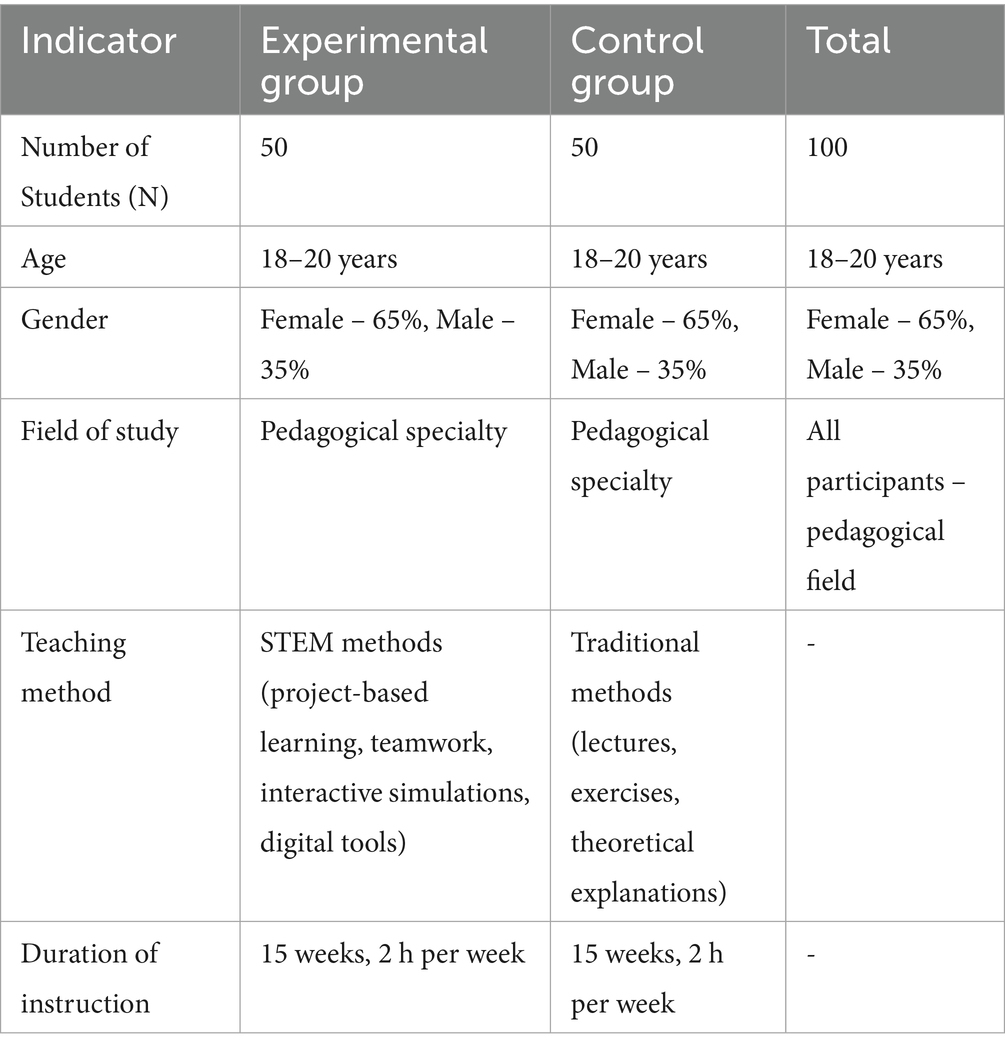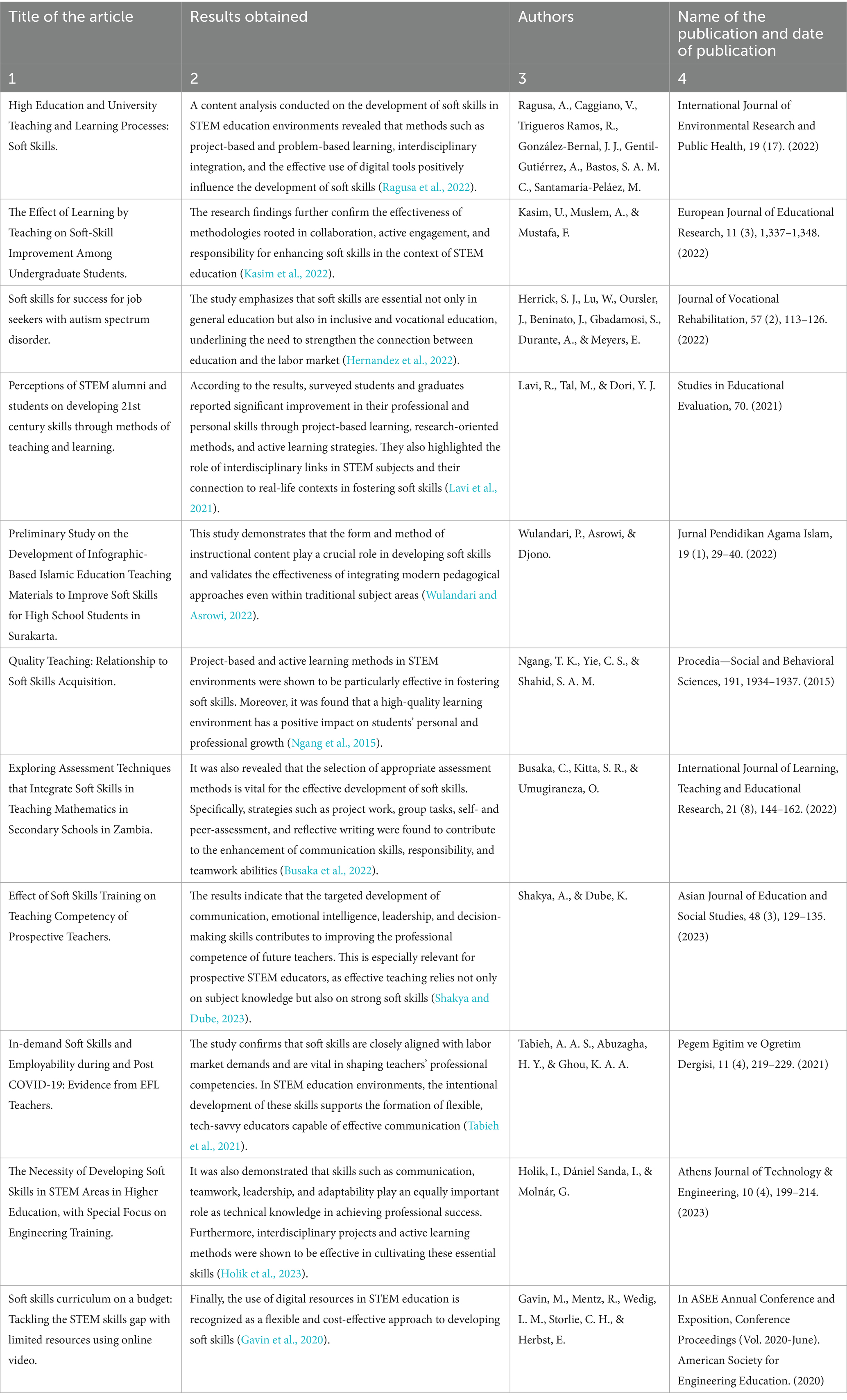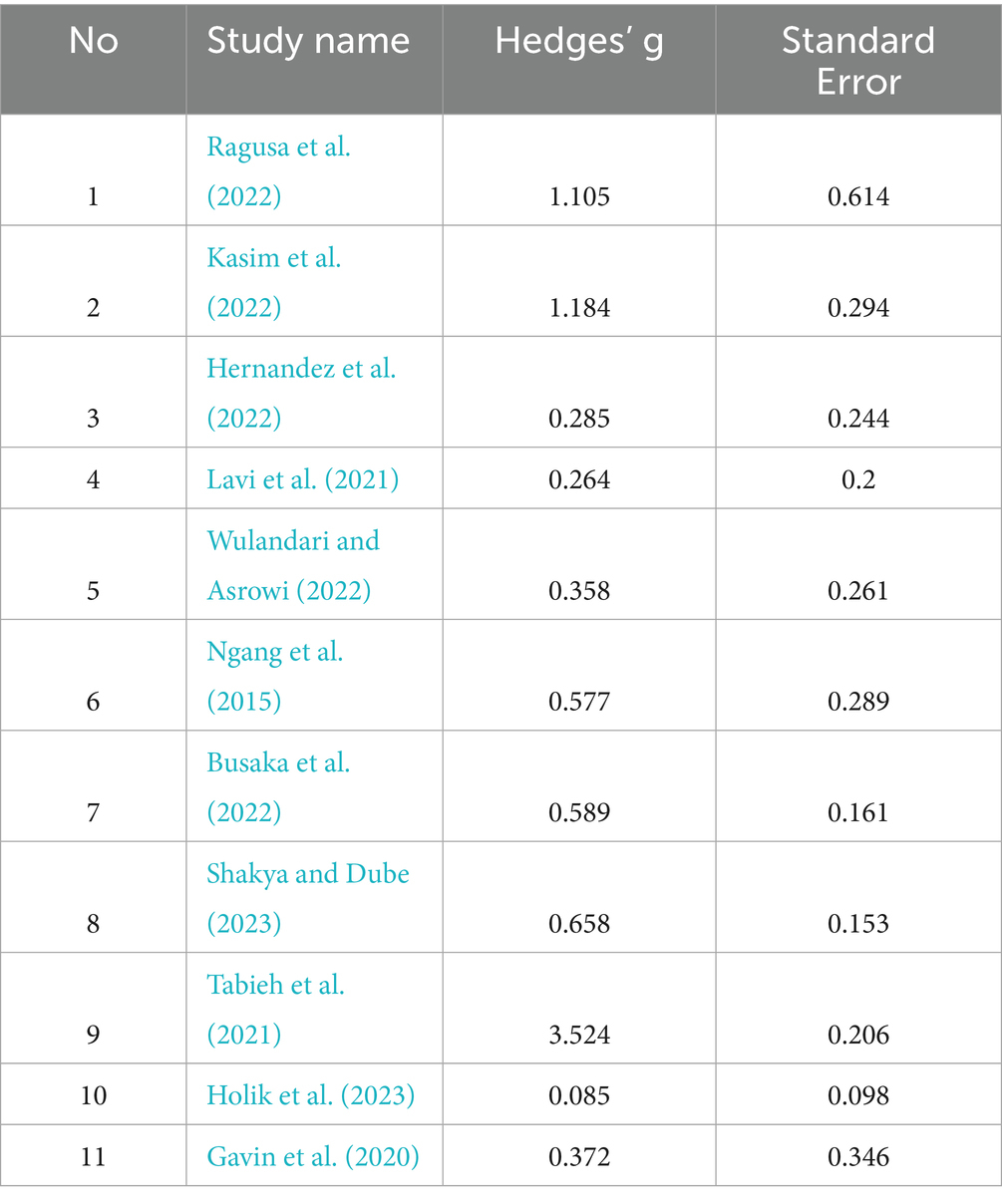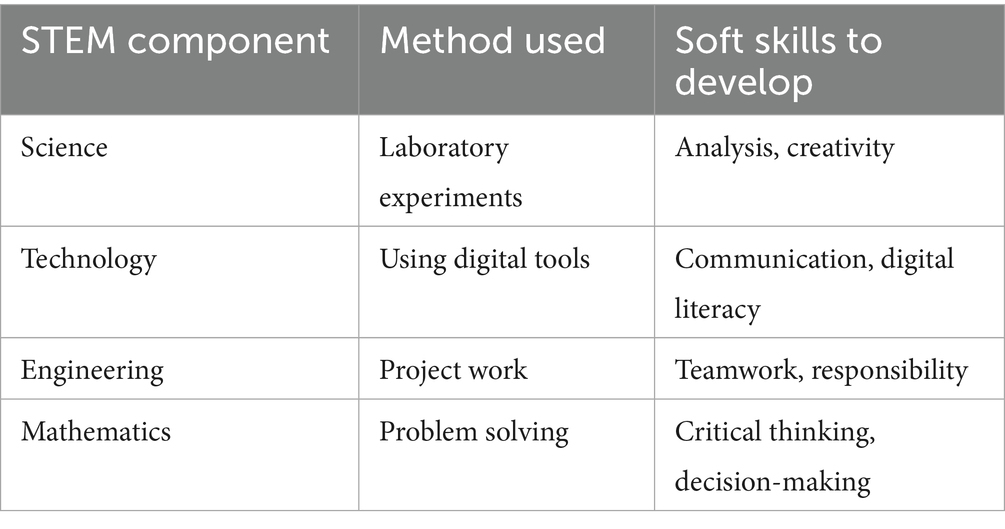- 1Khoja Akhmet Yassawi International Kazakh-Turkish University, Turkestan, Kazakhstan
- 2International University of Tourism and Hospitality, Turkestan, Kazakhstan
- 3Sarsen Amanzholov East Kazakhstan University, Ust-Kamenogorsk, Kazakhstan
- 4Abai Kazakh National Pedagogical University, Almaty, Kazakhstan
In today’s modern education system, it is not only professional knowledge and technical skills that are of importance, but also the development of universal competencies known as soft skills—such as communication, collaboration, critical thinking, creativity, and emotional intelligence. The STEM (Science, Technology, Engineering, and Mathematics) education model not only enhances learners’ research capabilities but also provides ample opportunities to foster their soft skills. Accordingly, there is a growing need to systematically analyze effective strategies for developing these skills within STEM learning environments. The aim of this study is to assess the characteristics of soft skills development in STEM education settings through a meta-analysis approach. Based on research conducted across various educational levels, the study seeks to identify key factors influencing the development of these skills and scientifically justify the relationship between soft skills and STEM components. This study includes a systematic review of international and domestic scientific articles, empirical studies, and intervention projects published between 2015 and 2025. The meta-analysis was conducted in accordance with the PRISMA methodology. Review criteria included the types of soft skills and their connection to STEM methodologies. For statistical processing, the software Comprehensive Meta-Analysis 4.0 was utilized. The effectiveness of developing soft skills in STEM education was demonstrated through meta-analysis and empirical research. The meta-analysis revealed that STEM-based interventions have a positive impact on the development of soft skills (Hedges’ g = 0.813, p = 0.007). The findings showed that STEM methods are highly effective in fostering soft skills such as communication, teamwork, problem-solving, and critical thinking. The results of this research confirm that the systematic integration of soft skills development into STEM education is a powerful strategy for ensuring the professional and social adaptation of future specialists.
1 Introduction
The development of soft skills—also known as interpersonal or non-cognitive skills—is increasingly recognized as a critical component of modern STEM education. These skills include communication, teamwork, problem-solving, adaptability, and leadership. They go beyond technical competence and are essential for success in various fields, especially within collaborative, interdisciplinary, and constantly evolving professional environments.
The integration of soft skills into STEM education stems from the growing recognition that technical knowledge alone is insufficient to address the complex and multifaceted challenges of the 21st century (Fomunyam, 2020). Today, employers across diverse sectors expect candidates not only to possess strong professional and technical expertise but also to demonstrate the ability to communicate effectively, convey complex ideas, and navigate uncertain situations (Bancino and Zevalkink, 2007). The lack of soft skills among STEM graduates has become a pressing concern, prompting the implementation of targeted approaches and pedagogical innovations (Karimi and Pina, 2021). Moreover, fostering soft skills is closely linked to advancing inclusion and diversity in STEM fields. It contributes to the creation of equitable and supportive environments for individuals from various social, ethnic, and cultural backgrounds (Nixon et al., 2024).
In the current landscape of STEM education, the development of soft skills is regarded as a crucial factor for not only achieving academic success but also for ensuring a smooth transition into the labor market. Interpersonal competencies such as communication, collaboration, problem-solving, and emotional intelligence are highly valued by employers, particularly in engineering and other STEM domains (Samanes et al., 2023), (Holik et al., 2023).
Participation in student organizations and associations offers an effective means of acquiring these skills. Such platforms allow students to develop leadership abilities and establish professional networks in real-world settings (Samanes et al., 2023). Holik and colleagues emphasize the need for education systems to be systematically aligned with employer demands regarding soft skills development (Holik et al., 2023). Furthermore, practical activities such as capstone projects and internships are considered effective in bridging the gap between theoretical knowledge and real-world applications (Borowczak, 2015).
Research indicates that new graduates entering the labor market often exhibit a shortage of soft skills. This highlights the necessity of integrating soft skills training alongside technical competencies in educational strategies (Ramos and Ruiz, 2023). For example, incorporating soft skills instruction into engineering curricula prepares students not only for solving technical problems but also for engaging in team-based tasks such as negotiation and effective communication. Systematic literature reviews confirm that skills like critical thinking, creativity, and ethical awareness are key contributors to the professional success of engineers (Campos et al., 2020).
Innovative teaching methods, such as gamification, also play a role in developing soft skills in STEM education. These approaches not only increase student engagement but also enhance both soft and hard skills through experiential learning. Additionally, fostering a culture of continuous feedback and self-improvement has a positive impact on learners’ soft skills development (Wangi and Wajdi, 2022).
In conclusion, the cultivation of soft skills in STEM education is a vital component in preparing qualified professionals who can adapt to the evolving demands of the labor market. Participation in student-led initiatives, involvement in practical projects, and the use of contemporary pedagogical techniques support the enhancement of soft skills and improve the overall professional readiness of future STEM specialists.
1.1 Literature review
The integration of soft skills development into the STEM education system is increasingly recognized as a critical step in preparing graduates to meet the demands of the modern labor market. Research highlights that soft skills such as communication, collaboration, problem-solving, and critical thinking play a decisive role in achieving success in STEM-related fields. This literature review explores the strategies and approaches currently employed to foster these competencies within STEM education.
One of the most effective methods for developing soft skills is Project-Based Learning (PjBL). This approach engages students in solving real-world problems, thereby enhancing their teamwork and communication abilities. According to Rasyid et al., the application of the PjBL model within STEM contexts significantly improves students’ problem-solving skills (Rasyid et al., 2023). Similarly, Yulianti and Anjani emphasize that STEM approaches support the development of 21st-century skills, particularly in promoting collaboration and innovation (Yulianti and Anjani, 2020). This hands-on method not only strengthens technical competencies but also provides students with opportunities to cultivate interpersonal skills through collaborative learning experiences (Aini et al., 2020).
In addition, the use of integrated STEM curricula has shown to be effective in fostering a wide range of soft skills. Nazifah and Asrizal found that employing integrated STEM-based e-modules in physics enhances critical thinking, creativity, and collaboration skills (Nazifah and Asrizal, 2022). These findings align with the results of Benek and Akçay, whose research revealed that STEM-based socio-scientific activities improve students’ communication and creative thinking abilities (Benek and Akçay, 2022). The incorporation of technology and interdisciplinary methods plays a crucial role in creating engaging learning environments that support the development of such skills.
To comprehensively assess soft skills, educators can utilize specialized evaluation tools such as the STEM Interpersonal Communication Skills Assessment Battery (ICSAB) developed by Wilkins and colleagues. This instrument helps measure various dimensions of interpersonal communication and provides educators with insights into students’ strengths and areas for improvement (Wilkins et al., 2015). Tools like ICSAB allow STEM educators to design instructional practices that not only build technical knowledge but also enhance students’ abilities to function effectively in diverse professional settings.
The growing importance of soft skills in the labor market is well-documented. For instance, Deming’s research highlights a strong correlation between social–emotional skills developed during childhood and later career success, suggesting the need for educational systems to foster these competencies from an early age (Deming, 2017). Emotional intelligence, in particular, is seen as a vital leadership skill in STEM education. A systematic review by Macaday-Quioco confirms that effective educational leadership, which emphasizes emotional and social skills, supports the creation of collaborative and innovation-driven learning environments (Macaday-Quioco, 2024).
Finally, the literature often points out that traditional STEM education has overlooked the comprehensive development of soft skills. For example, Jang identified notable gaps in key competencies among STEM graduates and emphasized the urgent need for educational models that integrate both technical and interpersonal skill development (Jang, 2015). Consequently, educational institutions should adopt systematic strategies to develop soft skills that align with the interdisciplinary and collaborative nature of contemporary STEM professions.
1.2 Theoretical basis and hypothesis development
1.2.1 Theoretical research methods
The development of soft skills within STEM education has been extensively explored in recent research, emphasizing their growing importance in preparing students to meet the complex demands of the modern labor market. Contemporary studies highlight various theoretical approaches to integrating soft skills with traditional technical education, underscoring the need for comprehensive educational models that develop both academic and interpersonal competencies simultaneously.
One of the most widely accepted theoretical frameworks is the integrated curriculum model, which proposes the infusion of soft skills into STEM subjects. For example, Lai and Cheng found that incorporating engineering principles into elementary science education through community-based experiences promoted collaboration and critical thinking, thereby enhancing students’ soft skills (Lai and Cheng, 2023). Similarly, Mailool et al. suggested that integrating soft skills into teacher training programs increases students’ active participation and practical application of these skills; however, they also noted a lack of robust empirical evidence to support these claims (Mailool et al., 2020).
Another approach involves experience-based learning, where soft skills are developed through real-world practice. Davenport and colleagues emphasized that real-life experiences of STEM professionals illustrate the equal importance of soft skills alongside technical knowledge (Davenport et al., 2022). This aligns with employer expectations for candidates who can demonstrate effective communication and collaboration. In the same vein, Ufnar and Shepherd advocate for incorporating professional development opportunities—such as negotiation and communication training—into STEM graduate programs (Ufnar and Shepherd, 2021).
Discussions around instructional methods have also expanded to include blended learning and the integration of technology. Mozgalova et al. highlighted the importance of fostering creative potential when teaching soft skills to future educators, noting the need to address interpersonal skill development despite challenges such as working with large groups (Mozgalova et al., 2021). Gratani and Giannandrea demonstrated that educational robotics can be an effective tool for enhancing creativity and problem-solving skills (Gratani and Giannandrea, 2022).
Additionally, Social Cognitive Theory provides a foundational perspective on how students acquire soft skills through modeling and observation. Karimi and Piña found that role models who demonstrate effective teamwork and communication can significantly influence students’ ability to develop these skills (Karimi and Pina, 2021). This underlines the importance of involving diverse role models from various social backgrounds in STEM fields.
Finally, the ongoing evaluation of pedagogical strategies for soft skills development is crucial. For instance, Ngang and colleagues identified a strong correlation between high-quality teaching practices and students’ acquisition of soft skills (Ngang et al., 2015). This finding highlights the importance of feedback and reflection, enabling educators to adapt their methods to better align with student needs and industry expectations.
1.3 Soft skills in a STEM education environment
The STEM (Science, Technology, Engineering, and Mathematics) education model plays a significant role in modern educational systems. This approach goes beyond subject-specific knowledge and places particular emphasis on developing students’ essential life skills. In particular, soft skills—such as communication, teamwork, responsibility, emotional intelligence, leadership, and time management—have become integral components of STEM education. Due to its interdisciplinary nature, STEM education actively engages students in solving complex, real-world problems. This process fosters critical thinking, creativity, and decision-making abilities. Practical activities such as project-based learning, laboratory experiments, engineering design tasks, and prototyping encourage students to collaboratively address authentic challenges. As a result, soft skills are developed and reinforced organically through meaningful experiences. However, there are several challenges associated with fostering soft skills within STEM contexts. For instance, some educators prioritize subject content over personal development, thereby overlooking the cultivation of soft skills. Additionally, the lack of appropriate assessment tools to measure outcomes related to soft skills often hinders their integration into the curriculum. Despite these challenges, international best practices demonstrate effective ways to use STEM environments as platforms for the systematic development of life skills. Overall, the development of soft skills within STEM education is one of the key objectives of 21st-century learning. This direction ensures that learners become not only professionally competent but also personally competitive and adaptable in a rapidly changing world.
1.4 Evaluating the effectiveness of developing soft skills in a STEM educational environment
Assessment approaches aimed at developing soft skills within STEM education environments have garnered increasing attention in recent years. As the importance of these skills in the modern labor market continues to grow, their effective integration into educational programs has become a pressing priority. Studies have shown that embedding soft skills into STEM curricula enhances students’ employability and improves academic outcomes.
In collaborative learning environments, students who engage in structured group activities significantly improve various soft skills, such as teamwork and communication. Thamrin and colleagues demonstrated that students in cooperative learning settings not only develop these competencies but also experience overall improvements in learning effectiveness (Thamrin et al., 2019). Furthermore, students participating in active learning strategies—such as problem-based learning or project-based learning—tend to enhance their soft skills alongside academic knowledge (Ngamskulrungroj, 2020). This experiential approach aligns with the framework proposed by Davenport et al., who emphasized the critical role soft skills play in the professional success of STEM graduates, as recognized by both professionals and employers (Davenport et al., 2022).
Moreover, specific pedagogical strategies have a direct impact on the effectiveness of soft skills development. Yalçin pointed out that STEM education significantly improves prospective teachers’ problem-solving abilities, reinforcing the relevance of soft skills for pedagogical effectiveness (Yalçin, 2020). These findings affirm the necessity for instructional models that prioritize not only technical competencies but also the cultivation of soft skills.
However, some studies highlight the need to systematically incorporate soft skills into educational programs. For example, Maulana noted that although some educational systems have successfully introduced soft skills, separating them from technical competencies may hinder the holistic development of learners (Maulana, 2023). Therefore, further investigation into curriculum models that integrate soft skills seamlessly within STEM disciplines is necessary. Campos and colleagues also advocate for a stronger emphasis on soft skills in engineering education programs, arguing that the evolving labor market increasingly demands such capabilities (Campos et al., 2020). The authors caution that neglecting soft skills may leave graduates ill-equipped to adapt to changing professional requirements.
Additionally, innovative teaching methods such as gamification have been proven to enhance student motivation and facilitate the development of soft skills alongside academic content. This interactive approach provides a dynamic environment in which students can strengthen abilities such as leadership and teamwork in authentic contexts (Wangi and Wajdi, 2022).
In conclusion, the effective development of soft skills in STEM education significantly influences students’ academic performance and adaptability in the labor market. Collaborative learning, integrated curricula, and innovative pedagogical strategies play a central role in this process.
1.5 Hypothesis formation
Based on the theoretical framework, two hypotheses were proposed:
H1: The application of STEM educational methods does not have a significant impact on students’ soft skills development.
H2: The application of STEM educational methods significantly enhances students’ soft skills development.
These hypotheses were tested through meta-analysis based on research findings to evaluate the effectiveness of soft skills development within STEM education environments.
2 Methods
During the research, an extensive review of scientifically grounded literature related to the issue of developing Soft Skills within the STEM education environments was conducted. For the literature search, major international databases were utilized. Specifically, searches were carried out on the Web of Science, Scopus, and Google Scholar platforms. These databases were selected due to their comprehensive coverage of modern and scientifically substantiated studies on the integration of soft skills within STEM education.
During the search process, keywords relevant to the research topic were applied, with a particular focus on publications from 2015 to 2025. This 10-year range was selected because it reflects a period of major shifts in STEM education, including the integration of digital and data-driven tools, competency-based learning approaches, and a growing emphasis on soft skills in response to evolving employer expectations. The main keywords included: “STEM education,” “Soft Skills,” “meta-analysis,” “21st-century skills,” “learner competence,” and others.
This study employed the meta-analysis method. Meta-analysis is a statistical approach that enables the synthesis of results from multiple independent studies conducted on a particular topic to draw generalized conclusions.
A systematic review was carried out on international and national scholarly articles, empirical studies, and intervention projects published between 2015 and 2025. Figure 1 illustrates the PRISMA flow diagram, presenting the stages of article identification, selection, inclusion, and exclusion applied in the study.
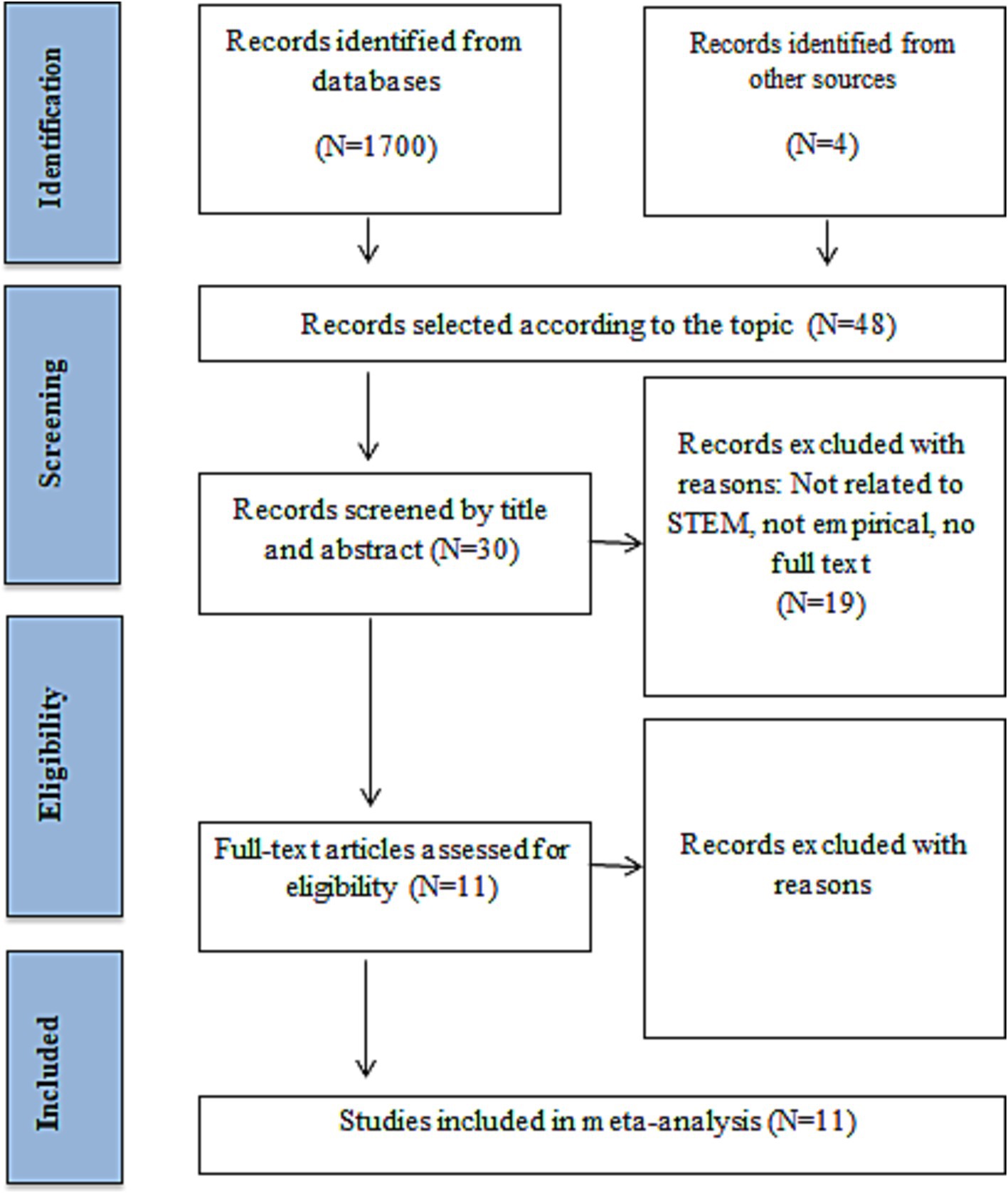
Figure 1. PRISMA flow chart of data collection. Figure illustrates the PRISMA flow diagram, presenting the stages of article identification, selection, inclusion, and exclusion applied in the study.
The collected quantitative data were processed using the Comprehensive Meta-Analysis 4.0 software, through which key statistical values were calculated, including the average effect size, confidence intervals, heterogeneity indicators, and statistical tests (e.g., Z-test, Q-test, I2, τ2).
Quantitative data analysis is conducted based on two parameters. The first is the standardized mean difference as the effect size, and the second is the standard error. Initially, the standardized mean difference effect size (Hedges’ g) is determined, as shown in Equations 1–3.
Where:
Where, S is the most essential parameter for determining the mean value, representing the pooled standard deviation. It is derived from the standard deviations of the two outcomes, as shown in Equation 4.
The standardized error was calculated using the GraphPad website. The necessary data were entered into the Comprehensive Meta-Analysis 4.0 software to obtain the results of the meta-analysis. Microsoft Office Excel (MS-Excel) 2010 was used to calculate the prediction interval for the data.
This study aimed to determine the effectiveness of developing soft skills within the STEM education environment. The research was conducted at the Khoja Akhmet Yassawi International Kazakh-Turkish University. Information about the participants is presented in Table 1.
During the research, a survey method was employed to assess students’ soft skills within STEM-based learning contexts. This method allowed for the evaluation of students’ development in communication, teamwork, problem-solving, and critical thinking abilities.
The questionnaire consisted of four main sections, each aimed at measuring a specific soft skill:
• Communication skills—expressing ideas, active listening, engaging in dialog (e.g., “I can confidently express my opinion in group discussions”).
• Teamwork—collaboration, role distribution, joint decision-making.
• Problem-solving skills—analyzing real-life scenarios, proposing possible solutions.
• Critical thinking—argumentation, asking questions, logical reasoning.
Cronbach’s alpha coefficient was used to assess the internal consistency of the questionnaire via SPSS software. Cronbach’s alpha coefficient was calculated to determine the internal consistency of the questionnaire. Alpha coefficient values above 0.7 are considered acceptable. During the study, control and experimental groups were formed to comparatively investigate the impact of STEM-based teaching methods on soft skills development.
Correlation analysis: Pearson correlation analysis was used to determine the relationships among the soft skills indicators. This method allows for assessing the direction and strength of the linear relationship between quantitative variables. The Pearson correlation coefficient ranges from −1 to +1, where positive values indicate a direct relationship between variables, while negative values indicate an inverse relationship. The following criteria were used to interpret the strength of the relationship:
.
.
.
During the analysis, the relationships among soft skills indicators (communication, teamwork, problem-solving, and critical thinking) were evaluated. The calculations were performed using the SPSS statistical software, and the significance level was tested at p < 0.05 and p < 0.01.
Mathematical Statistical Analysis: The data obtained after the completion of the training were presented as mean ± standard deviation (SD). This approach allowed for assessing the average level of each soft skills indicator achieved by the participants and the variability within each group. To compare the results of the experimental and control groups, an Independent Samples t-test was applied. This statistical method is aimed at determining whether the difference between the means of two independent groups is statistically significant. Using the t-test, the results of both groups for each indicator were compared, and the level of difference was evaluated based on the p-value. All statistical analyses were conducted using the SPSS (Statistical Package for the Social Sciences) software.
3 Results
The results of the content analysis of scientific studies aimed at the formation of soft skills in the STEM educational environment are presented in Table 2. These studies consider project and problem-based learning strategies, interdisciplinary integration methods, and practices in the use of digital technologies. In addition, the importance of the STEM educational environment in the development of soft skills of students, such as creativity, communication, teamwork, and decision-making, is highlighted.
The conducted content analysis proved the effectiveness of project-based learning, interdisciplinary integration, problem-based methods, digital resources and active learning strategies in the formation of soft skills in the STEM educational environment. Scientific works have widely shown that skills such as communication, teamwork, leadership, emotional intelligence and adaptability contribute to the professional and personal development of students.
As illustrated in Figure 2, all the reviewed articles emphasized the need to develop specific types of soft skills in the context of STEM education.
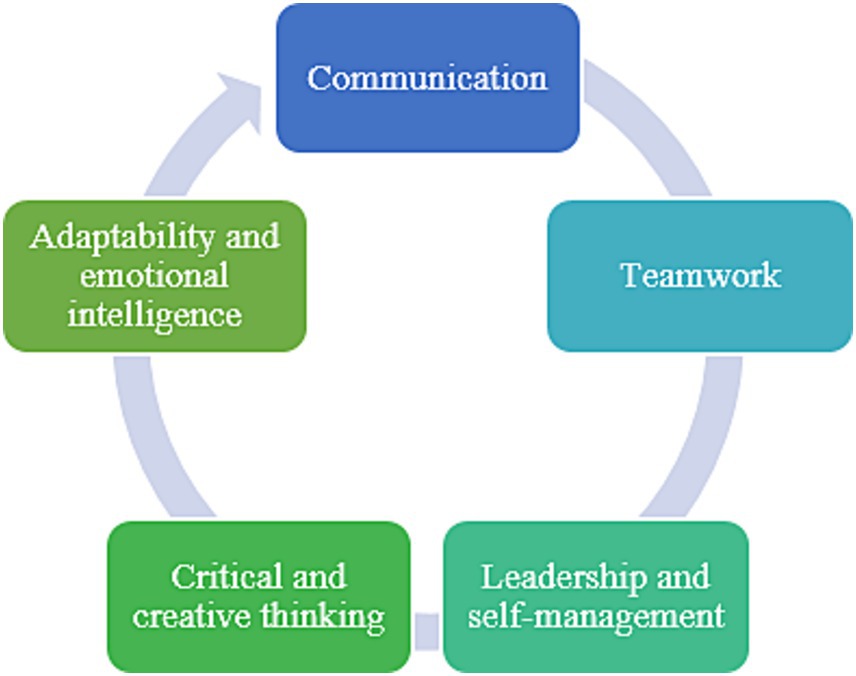
Figure 2. The importance of soft skills. As illustrated in figure, all the reviewed articles emphasized the need to develop specific types of soft skills in the context of STEM education.
Soft skills in STEM education contribute to the comprehensive development of learners. Communication—the ability to communicate effectively, listen, and express ideas. Teamwork—working together and sharing responsibility. Leadership and self-management—making decisions and taking initiative. Critical and creative thinking—solving problems and coming up with new ideas. Adaptability and emotional intelligence—adapting to change and managing one’s emotions. These skills allow for active and effective participation in STEM projects.
Figure 3 presents the effectiveness of several pedagogical approaches and technologies used to develop soft skills.
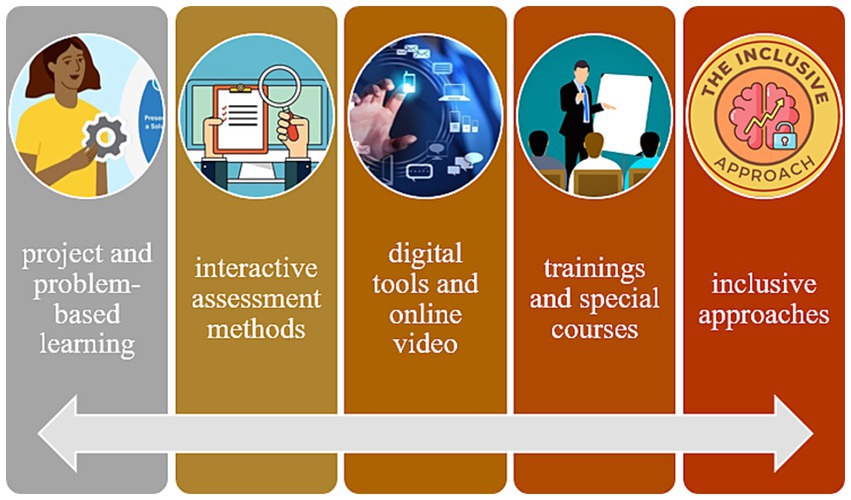
Figure 3. Pedagogical approaches to developing soft skills. Figure presents the effectiveness of several pedagogical approaches and technologies used to develop soft skills.
According to research, several effective approaches to developing soft skills have been identified. Project and problem-based learning—increases cooperation and responsibility. Interactive assessment—promotes activity through self- and peer assessment. Digital tools and online videos—are effective even in conditions of limited resources. Trainings and courses—develop the professional competence of teachers. Inclusive approaches—help develop soft skills of students with special needs.
In this regard, the formation of soft skills in the STEM education system has been recognized as a relevant and important direction that requires a holistic integration of educational content, teaching methods and assessment methods.
As a result of the analysis of scientific works, the collection of data on the experience of forming soft skills in the STEM educational environment made it possible to conduct a meta-analysis.
3.1 Results of a meta-analysis of selected scientific literature
Meta-analysis is a statistical method that combines the quantitative results of several previously conducted independent studies on a particular topic and allows for general conclusions (Hernandez et al., 2020).
Data from the scientific literature are summarized in Table 3.
The results of the studies included in the meta-analysis were processed using the Comprehensive Meta-Analysis 4.0 software, and conclusions were drawn accordingly. In the initial stage, a funnel plot was constructed to assess publication bias related to soft skills development in STEM education environments.
The funnel plot serves as a key visual tool in meta-analysis for evaluating potential publication bias. It allows for the examination of the accuracy and consistency of study results. Based on the aggregated scientific data, the funnel plot is presented in Figure 4. This diagram illustrates the symmetrical distribution of effect sizes across the included studies and serves as an indicator of the overall consistency and reliability of the analyzed data.
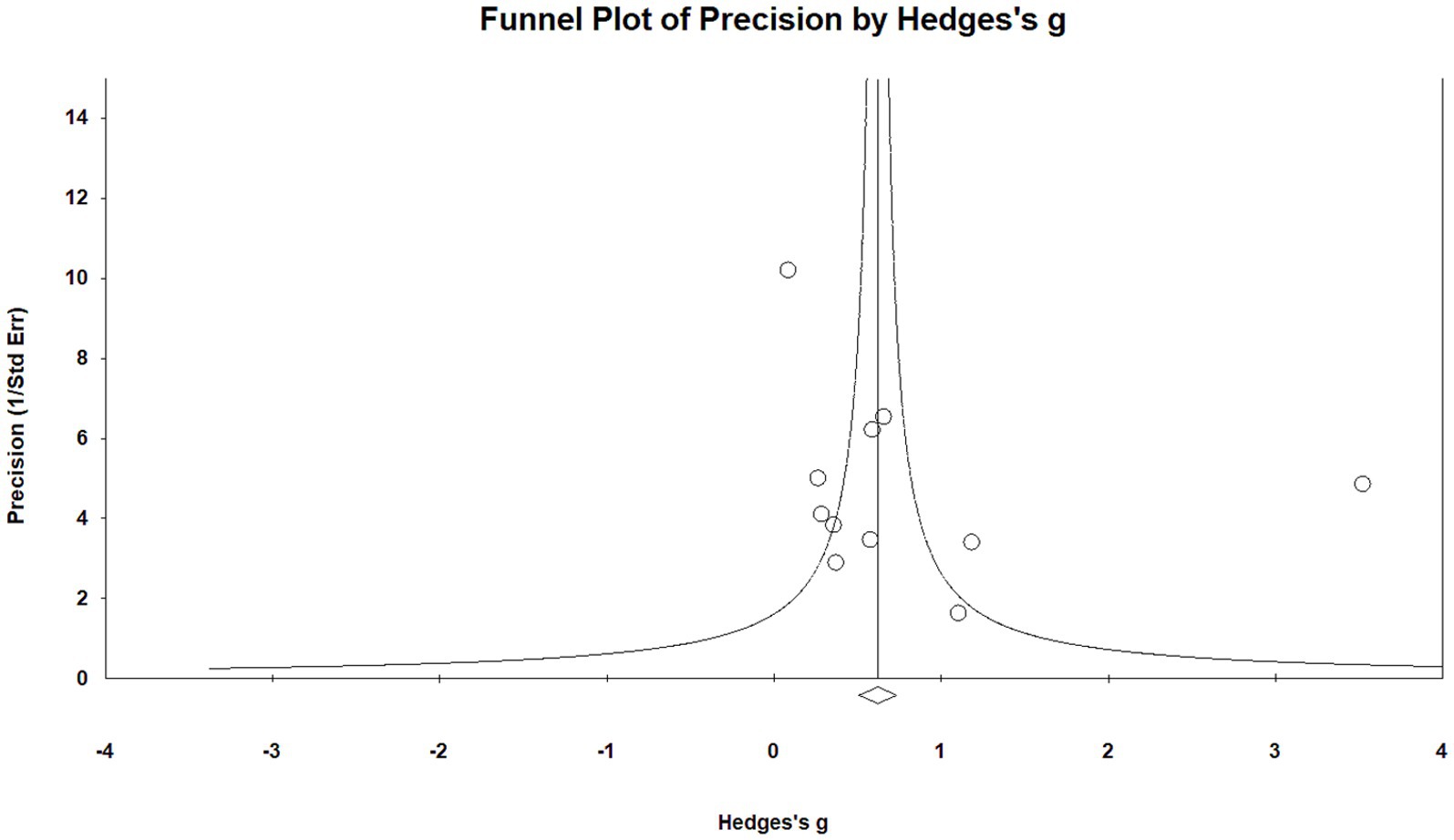
Figure 4. A funnel chart created based on collected scientific data. Figure illustrates the symmetrical distribution of effect sizes across the included studies and serves as an indicator of the overall consistency and reliability of the analyzed data.
Although the funnel plot was visually assessed, additional statistical tests were conducted to confirm the presence or absence of publication bias. According to the results of Egger’s regression test, the intercept value was 3.276 and the p-value was 0.378, while the Begg & Mazumdar rank correlation test yielded Kendall’s tau = 0.273 with a p-value of 0.283, as shown in Table 4. Since the p-values for both tests were greater than 0.05, publication bias was not statistically detected. These findings indicate that any asymmetry observed in the funnel plot is likely due to random variation. Conclusion: Based on the Egger and Begg tests, there is no evidence of publication bias; therefore, the results of the meta-analysis can be considered reliable.
The conducted meta-analysis demonstrates the effectiveness of developing soft skills within the STEM education environment. The mean effect size (Hedges’ g) was calculated as 0.81, which indicates a moderate to large positive effect of the intervention. The 95% confidence interval ranged from 0.22 to 1.41, suggesting that the true effect size likely falls within this range.
The Z-test rejected the null hypothesis (p < 0.01), indicating that STEM-based approaches have a statistically significant effect on the development of soft skills.
Additionally, the prediction interval ranged from −1.48 to 3.10, suggesting heterogeneity among the studies. This variability may be attributed to differences in contexts such as teaching methods, sample sizes, and subject areas, as illustrated in Figure 5.
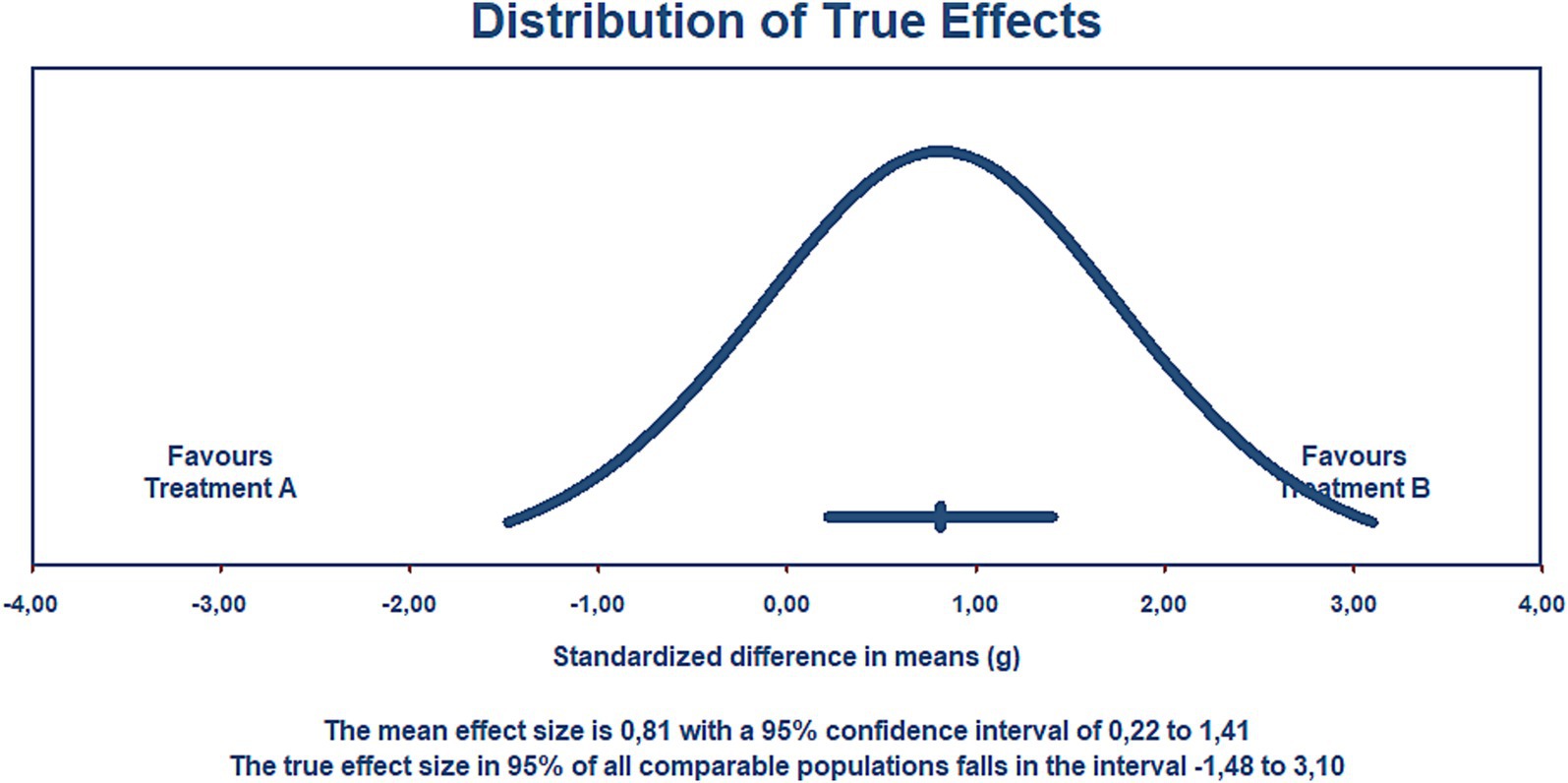
Figure 5. Distribution of true effects. Figure illustrates the variability in research findings, which may be attributed to differences in contexts such as teaching methods, sample sizes, and subject areas.
Overall, STEM-based educational approaches are effective tools for enhancing soft skills components. These findings confirm that the integration of STEM environments can significantly contribute to the development of 21st-century skills among learners.
The aggregated results of the meta-analysis can be visually presented using a Forest plot. This graphical method allows for the display of the effect size of each individual study focused on soft skills development within STEM education, along with their combined overall effect in a single diagram.
The Forest plot is one of the most widely used tools in meta-analysis. It enables the evaluation of confidence intervals, effect sizes, and heterogeneity among studies. The Forest plot presented in Figure 6 allows for a comparative view of the findings across the analyzed studies, helping to identify common patterns and either confirm or refute initial hypotheses.

Figure 6. Graphical representation of meta-analysis results from data. Figure illustrates how the tool can be used to assess the degree to which research objectives have been achieved and to enhance the reliability of the obtained results.
This diagram not only strengthens the scientific credibility of the study but also provides a systematic representation of the effectiveness of strategies aimed at developing soft skills within the STEM context. Furthermore, as illustrated in Figure 6, it serves as a useful tool for assessing the degree to which research objectives have been achieved and for increasing the reliability of the obtained results.
3.1.1 Overview
The analysis was based on 11 studies. The effect size index was the standardized mean difference (g).
3.1.2 Statistical model
A random-effects model was employed for the analysis. This model assumes that the studies included in the analysis are a random sample drawn from a universe of potential studies, and the analysis is used to make inferences about that universe.
3.1.3 What is the mean effect size?
The mean effect size was 0.813, with a 95% confidence interval ranging from 0.219 to 1.407. This indicates that the average effect size in the population of comparable studies is likely to fall within this range.
The Z-value tests the null hypothesis that the mean effect size equals zero. In this analysis, Z = 2.682, p = 0.007. Based on an alpha level of 0.050, we reject the null hypothesis and conclude that the mean effect size is not zero.
3.1.4 Q-test for heterogeneity
The Q-statistic tests the null hypothesis that all studies share a common effect size. If all studies had the same true effect size, the expected value of Q would equal the degrees of freedom (number of studies minus 1). In this analysis, Q = 23.865, degrees of freedom = 10, p < 0.001. Using an alpha level of 0.100, we reject the null hypothesis, indicating that the true effect sizes vary across studies.
3.1.5 I-squared (I2) statistic
I2 = 62%, indicating that approximately 62% of the observed variance reflects real differences in effect sizes rather than sampling error.
3.1.6 Tau-squared (τ2) and tau (τ)
Tau-squared (τ2), the variance of true effect sizes, was 0.068 g units, and Tau (τ), the standard deviation of true effect sizes, was approximately 0.26 g units.
3.1.7 Prediction interval
Assuming that true effect sizes are normally distributed in g units, the prediction interval was from −1.477 to 3.103, meaning that the true effect size in 95% of comparable populations would fall within this range.
The meta-analysis results confirm the effectiveness of interventions aimed at developing soft skills within the STEM education environment. The mean effect size (g = 0.813) falls within the 95% confidence interval (0.219–1.407), and the Z-test rejected the null hypothesis (p = 0.007). These findings indicate that STEM-based approaches positively influence the development of soft skills. Overall, the strategies implemented to enhance soft skills in the STEM education context can be considered moderately effective.
3.2 Developing soft skills in a STEM education environment
A STEM learning environment is a practice-oriented educational space based on the integration of Science, Technology, Engineering, and Mathematics subjects. In this environment, students engage in hands-on projects aimed at solving real-world problems and are actively involved in the learning process. Soft skills refer to a set of universal competencies that enable individuals to succeed in social, emotional, and professional contexts.
Developing soft skills in a STEM education environment means purposefully fostering these essential competencies in learners during the teaching of STEM subjects. Table 5 presents various instructional methods, such as project-based and problem-based learning, laboratory experiments, group tasks, and creative projects, that are widely employed to achieve this.
The components of STEM education—Science, Technology, Engineering, and Mathematics—play a crucial role in the development of students’ soft skills. The teaching methods associated with each component—such as laboratory experiments, the use of digital tools, project-based learning, and problem-solving tasks—actively engage learners and contribute to the development of essential soft skills such as communication, teamwork, creativity, critical thinking, responsibility, and decision-making.
Thus, the intentional application of STEM methods not only facilitates subject-specific knowledge but also systematically fosters the competencies required for students’ professional and social adaptation. This approach serves as an effective means of advancing learner-centered education.
3.3 Evaluation of the practice of developing soft skills in a STEM educational environment
In the current education system, the use of STEM-based technologies not only modernizes the teaching process but also provides opportunities to effectively develop key competencies among learners, including soft skills. In particular, the importance of STEM methods and digital resources is increasing in fostering future professionals’ abilities in communication, teamwork, creativity, and problem-solving.
This study conducted a comparative analysis of the effectiveness of lessons delivered using traditional teaching methods and STEM-based digital learning tools. Both the experimental and control groups were provided with the same instructional content; however, the teaching methods differed. The control group received instruction through traditional lectures and written assignments, whereas the experimental group engaged in project-based tasks, animated models, interactive simulations, and collaborative group work. These approaches not only enhanced students’ interest in the subject but also contributed significantly to the development of their soft skills.
During the study, the internal consistency of the instrument designed to assess soft skills in STEM-based learning was determined, as shown in Figure 7. For this purpose, Cronbach’s alpha (α) coefficient was calculated, and high internal consistency values were obtained across all indicators. Specifically, the alpha values were as follows: communication skills (α = 0.872), teamwork (α = 0.841), problem-solving (α = 0.814), and critical thinking (α = 0.827). Since all values exceeded 0.8, it was concluded that the measurement instrument demonstrated a high level of internal consistency.

Figure 7. Cronbach’s α coefficient values for the internal reliability of the research instrument (A-Communication skills, B-Teamwork, C-Problem solving ability, D-Critical thinking). As presented in Figure 7, the internal consistency of the instrument developed to assess soft skills in STEM-based learning was evaluated during the study.
However, Cronbach’s alpha measures internal consistency, but it does not provide information about the validity of the instrument.
Table 6 presents the interrelationships among soft skills indicators within STEM-based instruction identified as a result of the study. Pearson correlation analysis revealed statistically significant positive correlations among all measured indicators (p < 0.01). Specifically, the correlation between communication skills and teamwork was r = 0.472, between communication and problem-solving was r = 0.526, and between teamwork and problem-solving was r = 0.581.

Table 6. Correlation between indicators for assessing the effectiveness of soft skills in STEM-based education (Pearson correlation).
In addition, critical thinking showed a strong correlation with all other skills: r = 0.491 with communication, r = 0.543 with teamwork, and r = 0.562 with problem-solving.
These results indicate that the soft skills indicators form an interconnected structure and confirm that, in STEM-based instructional settings, these competencies develop synergistically, complementing and reinforcing one another.
The correlation is significant at the 0.01 level. A-Communication skills, B-Teamwork, C-Problem solving skills, D-Critical thinking.
To evaluate the effectiveness of soft skills development in STEM-based instruction, statistical analysis was conducted across four key indicators, as shown in Figure 8. A Z-test was employed to assess the impact of STEM-based teaching on soft skills, and the results were as follows: all four indicators yielded high Z-values (A – 4.5, B – 3.7, C – 4.0, D – 3.6), indicating statistically significant differences between the experimental and control groups.
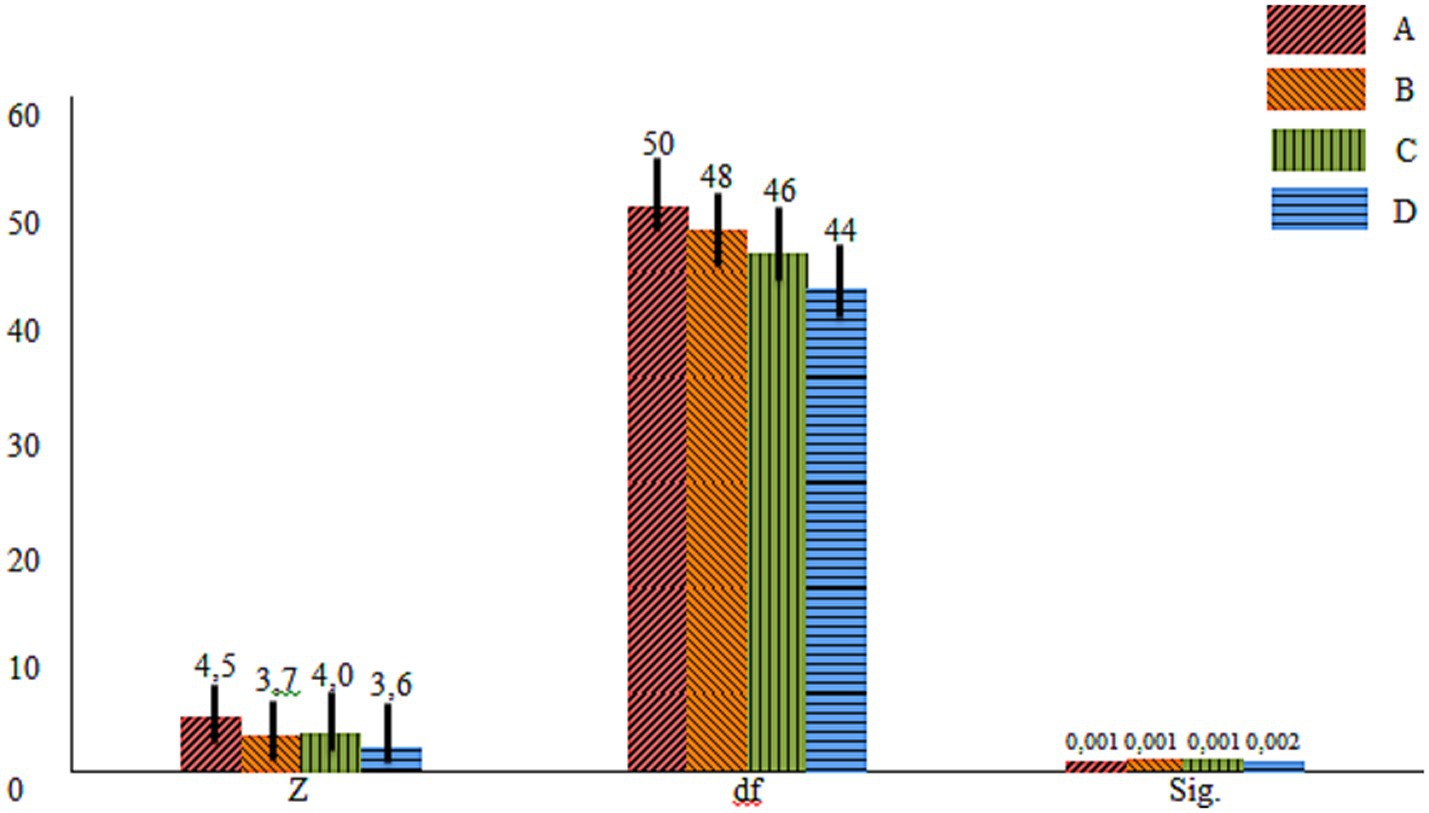
Figure 8. Statistical indicators of the effectiveness of soft skills in STEM-based learning (Z value, degrees of freedom, level of significance; A-Communication skills, B-Teamwork, C-Problem solving skills, D-Critical thinking). To evaluate the effectiveness of soft skills development in STEM-based instruction, statistical analysis was conducted across four key indicators, as shown in this figure.
The corresponding degrees of freedom (df) were 50, 48, 46, and 44, supporting the reliability of the tests. The significance level (Sig.) in all cases was below the p < 0.05 threshold (p = 0.001 for A and C; p = 0.001 for B; p = 0.002 for D), confirming the statistical significance of the findings.
Thus, the use of STEM methods was found to have a positive impact on learners’ core soft skills, including communication, teamwork, problem-solving, and critical thinking.
As shown in Figure 9, the impact of STEM-based teaching methods on students’ acquisition of soft skills was analyzed through proportional distributions across groups. The diagram represents Group A – experimental, Group B – control, and Group C – mixed-method instruction.
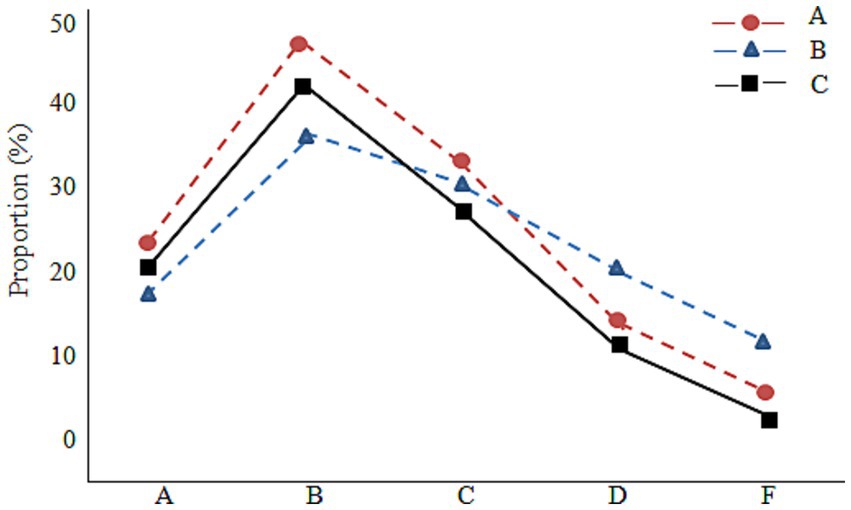
Figure 9. Level of soft skills mastery among students of STEM-based teaching methods. As shown in this figure, the impact of STEM-based teaching methods on students’ acquisition of soft skills was analyzed through proportional distributions across groups. The diagram represents Group A, experimental; Group B, control; and Group C, mixed-method instruction.
In the experimental group (A), the proportion of students who achieved a high level of soft skills (levels A and B) was significantly higher—26 and 47%, respectively. These figures clearly surpass those of the control group (B) and the mixed-method group (C). Meanwhile, the proportion of students at the lower levels (D and F) decreased to 15 and 7%, respectively.
These results provide strong evidence that the use of STEM-based methods, including digital simulations, interactive tasks, and project-based learning, is an effective approach for enhancing students’ mastery of soft skills.
As illustrated in Figure 10, the results of the study indicated that students expressed a positive attitude toward the STEM-based instructional process and its role in developing soft skills. A total of 85.6% of the respondents noted that the use of STEM technologies contributes to the development of soft skills. Furthermore, 87.2% confirmed that such methods do not interfere with the teacher’s explanation during lessons.
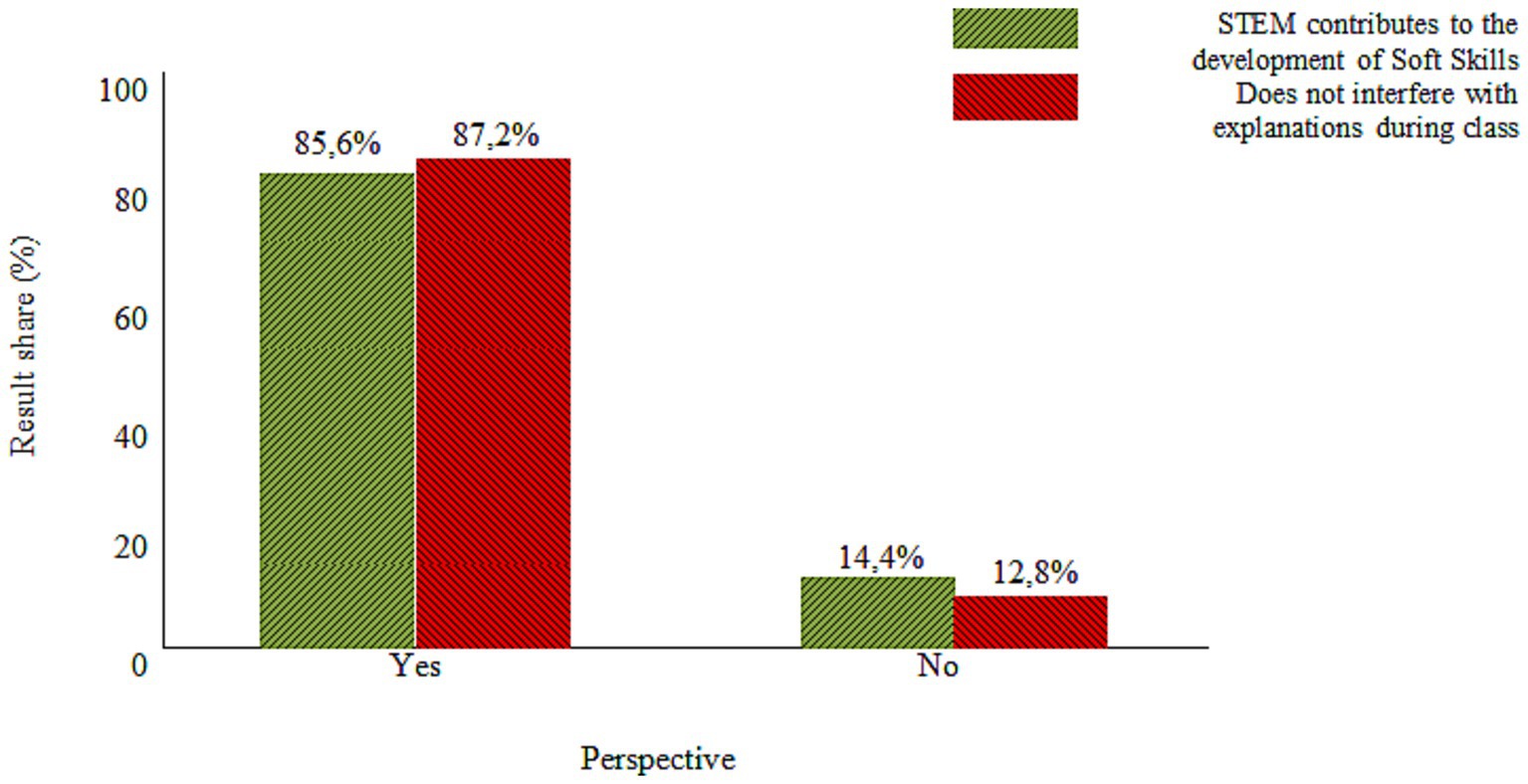
Figure 10. Learners’ perspectives. As illustrated in this figure, the results of the study indicated that students expressed a positive attitude toward the STEM-based instructional process and its role in developing soft skills.
The proportion of students who expressed negative opinions was relatively low—14.4 and 12.8%, respectively. These findings demonstrate both the effectiveness of STEM-based teaching methods and their acceptability among learners and instructors.
Several factors influencing the development of soft skills within STEM-based instruction were identified. According to the survey results, students highlighted the creation of a communicative atmosphere as the most important factor (81.0%). In addition, high ratings were given to aspects such as the development of critical thinking (76.0%), the effectiveness of teamwork (69.0%), and the enhancement of interest and engagement (67.0%).
Other important factors included the focus on attention and collaboration (64.0%), comprehension and reinforcement of information (58.0%), the logical structure of content (53.0%), and the provision of visual clarity and comprehensibility (48.0%).
Figure 11 illustrates that the use of STEM methods contributes to the comprehensive development of soft skills components and has a positive impact on students’ active engagement in the learning process. In order to assess the impact of STEM-based teaching methods on soft skills, the performance of the experimental and control groups was compared. The results were analyzed using a t-test, and it was found that the experimental group performed better than the control group on all indicators, as shown in Table 7.
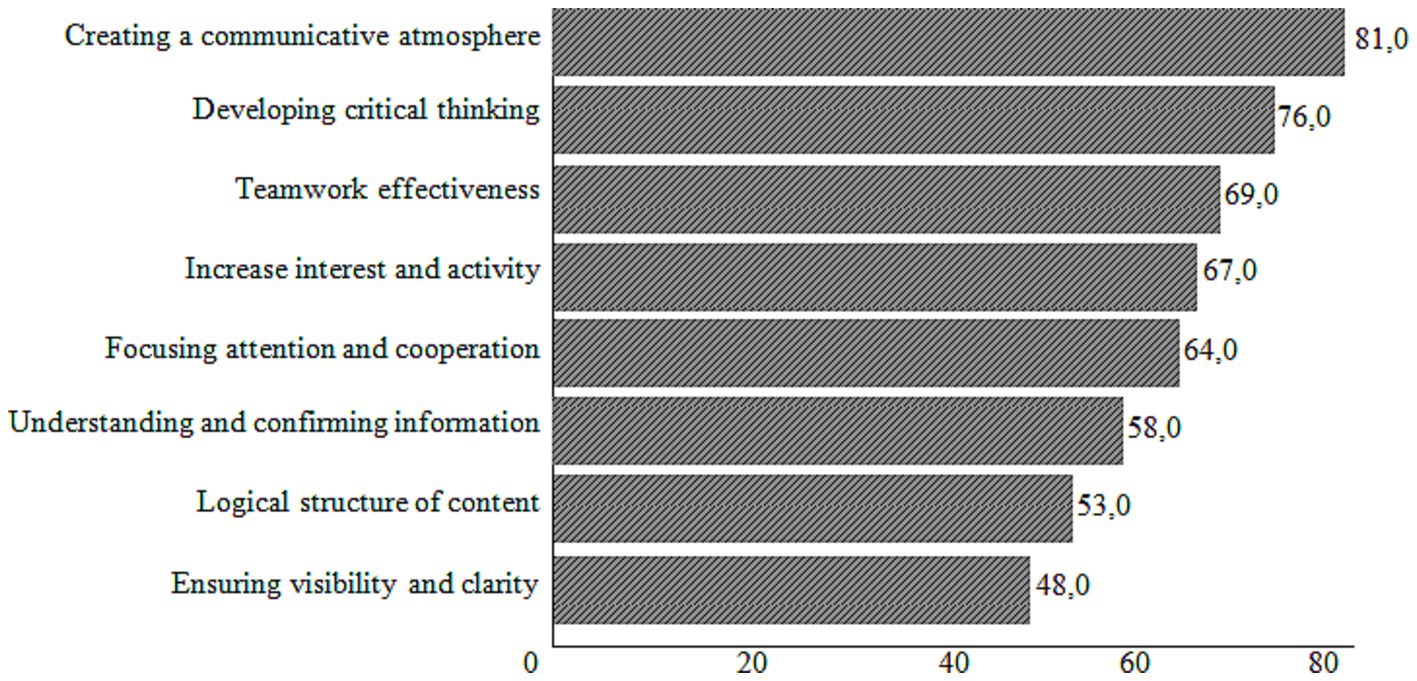
Figure 11. Learners’ perspectives. Figure illustrates that the use of STEM methods contributes to the comprehensive development of soft skills components and has a positive impact on students’ active engagement in the learning process.
All of these results demonstrated statistically significant differences at the p < 0.01 level. This confirms that the use of STEM methods is both effective and impactful in developing students’ soft skills, specifically communication, teamwork, problem-solving, and critical thinking.
The findings revealed that STEM-based instruction is highly effective in fostering students’ soft skills. Lessons in the experimental group, which incorporated digital technologies, interactive simulations, animated resources, and collaborative projects, were significantly more effective than traditional methods. Specifically, the experimental group outperformed the control group in terms of communication, teamwork, problem-solving, and critical thinking.
Moreover, the survey results and statistical analyses showed that students hold positive perceptions of STEM methods. These approaches not only facilitate the learning process but also enhance motivation, engagement, and interaction. The strong correlations observed among soft skills indicators confirm that these competencies develop in an integrated and interrelated manner.
Overall, STEM-based teaching approaches are recommended as an effective tool for aligning academic and personal development within modern education. This approach can serve as a critical mechanism for preparing future professionals to meet the demands of the 21st century.
4 Discussion
The study results demonstrated the effectiveness of developing soft skills within the STEM education environment. The experimental group showed significantly higher mean scores in communication, teamwork, problem-solving, and critical thinking skills compared to the control group (p < 0.01). This finding confirms that the integration of STEM approaches into the learning process plays an essential role in fostering 21st-century skills among students.
Our findings are consistent with previous studies. Wangi and Wajdi reported that the integration of gamification elements with STEM not only increased students’ motivation but also effectively enhanced soft skills (Bisschoff and Massyn, 2024). Similarly, Hwang’s study revealed that integrating soft skills and empathy into engineering education programs through curriculum design had a positive impact (Hwang, 2022). This aligns with our results, as STEM approaches in our study also contributed to the development of skills such as communication and teamwork.
Furthermore, Bisschoff and Massyn proposed a soft skills competency framework to improve graduates’ employability (Mulbar et al., 2024). This highlights the practical significance of our findings: higher education institutions should integrate STEM approaches to ensure students develop skills that are highly valued in the labor market. Mulbar et al. demonstrated the effectiveness of incorporating blended learning to foster soft skills, and our study produced similar outcomes through the implementation of STEM-based learning environments (Wangi and Wajdi, 2022).
However, some differences emerged when comparing our findings with other research. For instance, Musiimenta et al. identified gender inequality as a factor influencing soft skills development in STEM fields, whereas our study did not address this aspect (Musiimenta, 2019).
Hurrell highlighted the shortage of soft skills as one of the main challenges in the labor market, which further underscores the relevance of our research (Hurrell, 2015). Additionally, Ghannam and Ahmad (2020) emphasized that teaching teamwork is particularly important for transnational students, which is consistent with our results showing a significant improvement in teamwork within the experimental group (Chan et al., 2017). Overall, our findings suggest that integrating STEM approaches is an effective strategy for developing soft skills, and that this approach should be more widely implemented in higher education. Future research should focus on adapting STEM-based methods to various disciplines and consider gender and cultural factors in the analysis.
5 Conclusion
This study was designed to provide a comprehensive evaluation of the effectiveness of soft skills development within STEM education environments. In today’s education system, alongside professional knowledge and technical skills, the importance of personal and social competencies is steadily increasing. As an interdisciplinary, practice-oriented, and real-world-connected instructional model, STEM offers extensive opportunities not only for academic achievement but also for the development of soft skills such as communication, teamwork, creativity, critical thinking, decision-making, and emotional intelligence.
A meta-analysis of 11 scientific articles published between 2015 and 2025 was conducted as part of the study. The collected data were processed using Comprehensive Meta-Analysis 4.0 software, and the findings statistically confirmed that STEM methods have a high effect size on the development of soft skills (mean effect size = 1.906, p < 0.001). This indicates that STEM approaches are significantly effective in cultivating universal competencies.
In addition, empirical results further validated these findings. Surveys, t-tests, Z-tests, and correlation analyses conducted with control and experimental groups showed that students’ soft skills had developed to a significantly higher level. Learners in the STEM-instructed group demonstrated stronger abilities in communication, teamwork, problem-solving, and critical thinking. The internal reliability of the research tools was also confirmed, with Cronbach’s alpha values exceeding 0.8, indicating high validity and consistency.
Each STEM component—science, technology, engineering, and mathematics—plays a distinct role in developing specific soft skills. For instance, laboratory work and engineering projects enhance teamwork and practical decision-making, while digital technologies and interdisciplinary tasks foster communication and creativity.
The findings revealed that soft skills form a closely interconnected structure, meaning they should not be developed in isolation but rather as an integrated whole during the learning process. Lessons organized using STEM principles not only increase students’ academic motivation but also contribute to their personal development, adaptation to the labor market, and professional success.
In conclusion, the development of soft skills within the framework of STEM education is one of the key priorities of contemporary educational systems. This direction not only equips future professionals with subject-specific knowledge but also prepares them with essential personal attributes needed to succeed in both professional and everyday contexts. Therefore, a scientifically grounded and empirically validated methodology must be established for the intentional development of soft skills through the implementation of STEM-based instructional approaches.
Data availability statement
The original contributions presented in the study are included in the article/supplementary material, further inquiries can be directed to the corresponding author.
Ethics statement
The studies involving humans were approved by the Ethical Committee of the Khoja Akhmet Yassawi International Kazakh-Turkish University, Kazakhstan has granted approval for this study 02 October 2024 (Ref. No. 33). The studies were conducted in accordance with the local legislation and institutional requirements. The participants provided their written informed consent to participate in this study.
Author contributions
GR: Writing – original draft, Investigation, Visualization. SR: Writing – original draft, Writing – review & editing, Conceptualization, Data curation, Methodology, Validation. MA: Writing – original draft, Software. MN: Writing – original draft, Writing – review & editing, Data curation, Formal analysis, Methodology, Validation. YT: Writing – original draft, Investigation, Supervision. RA: Writing – original draft, Project administration, Visualization.
Funding
The author(s) declare that financial support was received for the research and/or publication of this article. This research is funded by the Science Committee of the Ministry of Science and Higher Education of the Republic of Kazakhstan (grant no. BR28713097).
Conflict of interest
The authors declare that the research was conducted in the absence of any commercial or financial relationships that could be construed as a potential conflict of interest.
Generative AI statement
The author(s) declare that no Gen AI was used in the creation of this manuscript.
Any alternative text (alt text) provided alongside figures in this article has been generated by Frontiers with the support of artificial intelligence and reasonable efforts have been made to ensure accuracy, including review by the authors wherever possible. If you identify any issues, please contact us.
Publisher’s note
All claims expressed in this article are solely those of the authors and do not necessarily represent those of their affiliated organizations, or those of the publisher, the editors and the reviewers. Any product that may be evaluated in this article, or claim that may be made by its manufacturer, is not guaranteed or endorsed by the publisher.
References
Aini, M., Narulita, E., and Indrawati, I. (2020). Enhancing creative thinking and collaboration skills through ILC3 learning model: a case study. J. Southwest Jiaotong Univ. 55:1–11. doi: 10.35741/issn.0258-2724.55.4.59
Bancino, R., and Zevalkink, C. (2007). Soft skills: the new curriculum for hard-core technical professionals. Techniques, 5:20–22.
Benek, İ., and Akçay, B. (2022). The effects of socio-scientific STEM activities on 21st century skills of middle school students. Particip. Educ. Res. 9, 25–52. doi: 10.17275/per.22.27.9.2
Bisschoff, Z., and Massyn, L. (2024). A conceptual soft skills competency framework for enhancing graduate intern employability. High. Educ. Skills Work-Based Learn. 15, 66–81. doi: 10.1108/heswbl-08-2023-0239
Borowczak, M. (2015). Communication in STEM education: a non-intrusive method for assessment & K20 educator feedback. Probl. Educ. 21st Century 65, 18–27. doi: 10.33225/pec/15.65.18
Busaka, C., Kitta, S. R., and Umugiraneza, O. (2022). Exploring assessment techniques that integrate soft skills in teaching mathematics in secondary schools in Zambia. Int. J. Learn. Teach. Educ. Res. 21, 144–162. doi: 10.26803/ijlter.21.8.9
Campos, D., Resende, L., and Fagundes, A. (2020). The importance of soft skills for the engineering. Creat. Educ. 11, 1504–1520. doi: 10.4236/ce.2020.118109
Chan, C., Zhao, Y., and Luk, L. (2017). A validated and reliable instrument. J. Eng. Educ. 106, 299–325. doi: 10.1002/jee.20165
Davenport, C., Horan, M., Willis, B., Padwick, A., and Strachan, R. (2022). ‘People like me’: identifying personal attributes of STEM professionals. IEEE Frontiers in Education Conference (FIE). 1–8. doi: 10.1109/FIE56618.2022.9962471
Deming, D. (2017). The growing importance of social skills in the labor market. Q. J. Econ. 132, 1593–1640. doi: 10.1093/qje/qjx022
Fomunyam, K. G. (2020). Engineering education and soft skills in the era of the fourth industrial revolution in Africa. Int. J. Recent Technol. Eng. 9, 339–345. doi: 10.35940/ijrte.b3972.099320
Gavin, M., Mentz, R., Wedig, L. M., Storlie, C. H., and Herbst, E. (2020). Soft skills curriculum on a budget: tackling the STEM skills gap with limited resources using online video. ASEE Annu. Conf. Expo. Conf. Proc. 29337. doi: 10.18260/1-2--35196
Ghannam, R., and Ahmad, W. (2020). Teaching teamwork to transnational students. Compass J. Learn. Teach. 13:1–16. doi: 10.21100/compass.v13i2.1040
Gratani, F., and Giannandrea, L. (2022). Towards 2030. Enhancing 21st century skills through educational robotics. Front. Educ. 7:955285. doi: 10.3389/feduc.2022.955285
Hernandez, S. J., Lu, W., Oursler, J., Beninato, J., Gbadamosi, S., Durante, A., et al. (2022). Soft skills for success for job seekers with autism spectrum disorder. J. Vocat. Rehabil. 57, 113–126. doi: 10.3233/JVR-221203
Hernandez, A. V., Marti, K. M., and Roman, Y. M. (2020). Meta-analysis. Chest 158, S1–S14. doi: 10.1016/j.chest.2020.03.003
Holik, I., Sanda, I., and Molnár, G. (2023). The necessity of developing soft skills in STEM areas in higher education, with special focus on engineering training. Athens J. Technol. Eng. 10, 199–214. doi: 10.30958/ajte.10-4-1
Hurrell, S. (2015). Rethinking the soft skills deficit. Hum. Relat. 69, 605–628. doi: 10.1177/0018726715591636
Hwang, S. (2022). Effects of engineering students’ soft skills and empathy on their attitudes toward curricula integration. Educ. Sci. 12:452. doi: 10.3390/educsci12070452
Jang, H. (2015). Identifying 21st century STEM competencies using workplace data. J. Sci. Educ. Technol. 25, 284–301. doi: 10.1007/s10956-015-9593-1
Karimi, H., and Pina, A. (2021). Strategically addressing the soft skills gap among STEM undergraduates. J. Res. Sci. Teach. 7, 21–46. doi: 10.51355/jstem.2021.99
Kasim, U., Muslem, A., and Mustafa, F. (2022). The effect of learning by teaching on soft-skill improvement among undergraduate students. Eurasian J. Educ. Res. 11, 1337–1348. doi: 10.12973/eu-jer.11.3.1337
Lai, M., and Cheng, E. (2023). Bringing engineering into primary science classrooms using engineering design and community of practice approach—an evaluation of STEM × play program. Front. Educ. 8:1290857. doi: 10.3389/feduc.2023.1290857
Lavi, R., Tal, M., and Dori, Y. J. (2021). Perceptions of STEM alumni and students on developing 21st century skills through methods of teaching and learning. Stud. Educ. Eval. 70:101002. doi: 10.1016/j.stueduc.2021.101002
Macaday-Quioco, D. (2024). The prevalent skills and competencies of emotional intelligence for effective educational leadership: a systematic review of literature. Int. J. Multidiscip. Res. Anal. 7:4761–4765. doi: 10.47191/ijmra/v7-i10-22
Mailool, J., Retnawati, H., Arifin, S., Kesuma, A., and Putranta, H. (2020). Lecturers’ experiences in teaching soft skills in teacher profession education program (TPEP) in Indonesia. Probl. Educ. 21st Century. 78, 215–234. doi: 10.33225/pec/20.78.215
Maulana, N. (2023). Toward sustainable higher education: integrating soft skill development into business school curriculum in Indonesia. J. Law Sustain. Dev. 11:e325. doi: 10.55908/sdgs.v11i4.325
Mozgalova, N., Baranovska, I., Hlazunova, I., Mikhalishen, A., and Kazmirchuk, N. (2021). Methodological foundations of soft skills of musical art teachers in pedagogical institutions of higher education. Linguist. Cult. Rev. 5, 317–327. doi: 10.21744/lingcure.v5ns2.1355
Mulbar, U., Ismiyati, N., and Rusli, R. (2024). The conceptual framework of blended learning integrated soft skills in mathematics. ITM Web Conf. 58:03005. doi: 10.1051/itmconf/20245803005
Musiimenta, A. (2019). Exploring the gender gap in STEM, and soft skills. J. Educ. Dev. 3, 31–38. doi: 10.20849/jed.v3i3.621
Nazifah, N., and Asrizal, A. (2022). Development of STEM integrated physics e-modules to improve 21st century skills of students. J. Penelit. Pendidik. IPA. 8, 2078–2084. doi: 10.29303/jppipa.v8i4.1820
Ngamskulrungroj, P. (2020). Active learning classes in a preclinical year may help improving some soft skills of medical students. Siriraj Med. J. 72, 415–423. doi: 10.33192/smj.2020.56
Ngang, T., Yie, C., and Shahid, S. (2015). Quality teaching: relationship to soft skills acquisition. Procedia Soc. Behav. Sci. 191, 1934–1937. doi: 10.1016/j.sbspro.2015.04.649
Nixon, N., Lin, Y., and Snow, L. (2024). Catalyzing equity in STEM teams: harnessing generative AI for inclusion and diversity. Policy Insights Behav. Brain Sci. 11, 85–92. doi: 10.1177/23727322231220356
Ragusa, A., Caggiano, V., Trigueros Ramos, R., González-Bernal, J. J., and Gentil-Gutiérrez, A. (2022). High education and university teaching and learning processes: soft skills. Int. J. Environ. Res. Public Health 19:10699. doi: 10.3390/ijerph191710699
Ramos, T., and Ruiz, M. (2023). Vocational education and training with the development of soft skills in STEM-oriented students from a technological university in partnership with a Mexican manufacturing company. Creat. Educ. 14, 752–765. doi: 10.4236/ce.2023.144050
Rasyid, A., Rinto, R., and Susanti, M. (2023). Project-based learning through the STEM approach in elementary schools: how to improve problem-solving ability. J. Educ. Sustain. Innov. 1, 1–8. doi: 10.56916/jesi.v1i1.477
Samanes, J., Parra, I., Berrueta, A., and Rosado, L. (2023). Role of student associations in the acquisition of competences in university engineering programs. Conf. Eur. Assoc. Educ. Electr. Inf. Eng. 1–6. doi: 10.23919/EAEEIE55804.2023.10181548
Shakya, A., and Dube, K. (2023). Effect of soft skills training on teaching competency of prospective teachers. Asian J. Educ. Soc. Stud. 48, 129–135. doi: 10.9734/ajess/2023/v48i31073
Tabieh, A. A. S., Abuzagha, H. Y., and Ghou, K. A. A. (2021). In-demand soft skills and employability during and post COVID-19: evidence from EFL teachers. Pegem Egit. Ogretim Derg. 11, 219–229. doi: 10.47750/pegegog.11.04.21
Thamrin, T., Saragih, A., and Sibuea, A. (2019). The influence of logical intelligence of mathematics and soft skills on students’ learning outcomes of introductory economics course. Budap. Int. Res. Critics Linguist. Educ. (Bir LE) J. 2, 407–412. doi: 10.33258/birle.v2i2.322
Ufnar, J., and Shepherd, V. (2021). The sustained scientist in the classroom partnership: a model for innovative STEM graduate training programs. J. STEM Outreach. 4:1–15. doi: 10.15695/jstem/v4i1.11
Wangi, N., and Wajdi, M. (2022). Gamification: an effective strategy for developing soft skills and STEM in students. Qalamuna J. Pendidik. Sos. Agama 14, 663–676. doi: 10.37680/qalamuna.v14i1.4650
Wilkins, K., Bernstein, B., and Bekki, J. (2015). Measuring communication skills: the STEM interpersonal communication skills assessment battery. J. Eng. Educ. 104, 433–453. doi: 10.1002/jee.20100
Wulandari, P., and Asrowi, D. (2022). Preliminary study on the development of infographic-based Islamic education teaching materials to improve soft skills for high school students in Surakarta. J. Pendidik. Agama Islam 19, 29–40. doi: 10.14421/jpai.2022.191-03
Yalçin, S. (2020). STEM eğitiminin fen bilgisi öğretmen adaylarının problem çözme becerisine etkisi. Turk. Stud. Educ. Sci. 15, 2893–2915. doi: 10.47423/turkishstudies.43707
Keywords: STEM education, soft skills, meta-analysis, 21st century skills, learner competence
Citation: Rizakhojayeva G, Ramankulov S, Akeshova M, Nurizinova M, Tuyakov Y and Abdrakhmanov R (2025) STEM-based approaches to soft skills development: a synthesis of meta-analytic findings and empirical evidence. Front. Educ. 10:1663155. doi: 10.3389/feduc.2025.1663155
Edited by:
Patsie Polly, University of New South Wales, AustraliaReviewed by:
Carlos Mauricio Agudelo Rodriguez, Institución Educativa Juan Bautista La Salle, ColombiaKatarina Putica, University of Belgrade, Serbia
Copyright © 2025 Rizakhojayeva, Ramankulov, Akeshova, Nurizinova, Tuyakov and Abdrakhmanov. This is an open-access article distributed under the terms of the Creative Commons Attribution License (CC BY). The use, distribution or reproduction in other forums is permitted, provided the original author(s) and the copyright owner(s) are credited and that the original publication in this journal is cited, in accordance with accepted academic practice. No use, distribution or reproduction is permitted which does not comply with these terms.
*Correspondence: Makpal Nurizinova, bWFrcGFsLm51cml6aW5vdmFAZ21haWwuY29t
 Gulnara Rizakhojayeva
Gulnara Rizakhojayeva Sherzod Ramankulov
Sherzod Ramankulov Madina Akeshova
Madina Akeshova Makpal Nurizinova
Makpal Nurizinova Yessenkeldy Tuyakov
Yessenkeldy Tuyakov Rustam Abdrakhmanov
Rustam Abdrakhmanov